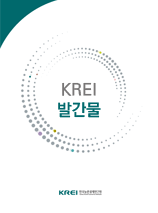
- 70 Years' Achievements and New Challenges of Korean Agriculture and Rural Communities
-

-
○ The most remarkable achievement of the Korean agricultural sector since independence is the accomplishment of rice (staple grain) self-sufficiency and the securing of the ability to supply various foods.
- Despite the inevitable contraction of agriculture in the process of rapid economic development, the growth and sacrifice of agriculture and rural communities, including poverty eradication, labor supply, and price stabilization, can be evaluated to have become a foundation for high industrialization and urbanization.
- Economic growth has changed demand for agricultural products and raised labor opportunity costs. Thus, production was converted to agricultural produce with income elasticity and labor's high value-added productivity. This change in production enabled agriculture to grow continuously.
○ Over the past 70 years, rural areas have also experienced dynamic changes. The Saemaul Movement, which is globally considered as a successful rural development strategy, was developed, and diverse policies were implemented, including an increase in non-farm income, the establishment of production infrastructures, the expansion of commercial crops, and rural development for the stabilization of the rural economy and society.
- In the industrialization process, however, young people with high productivity left for cities, which led to the decrease and aging of rural population.
- Recently, the population who returned to farming and rural areas and people with higher education have been on the rise. Although those employed in the primary industry greatly decreased, those in the secondary and tertiary industries increased. Also, rural dwelling conditions have been gradually improved to the level of cities.
○ This edition introduces the changes in agriculture and rural communities that have played a critical role as the foundation for the growth of the Republic of Korea in the 70th anniversary of liberation.
- Quantitative changes were examined with a focus on major macroeconomic indicators, achievements were summarized, and new challenges of Korean agriculture and rural regions were drawn.
- The analysis of major macroeconomic indicators was based on official statistics, including the Population and Housing Census, the Agricultural Census, KOrean Statistical Information Service (KOSIS), e-National Indicators, The Bank of Korea's Economic Statistics System (ECOS), and Major Statistics on Agriculture, Forestry and Food. For data analysis, available statistics from the time of independence to 2015 were utilized.
○ Although limited to quantitative data, this edition was a good opportunity to examine the changes in farm households and rural residents' lives. It is expected that Korean agriculture and rural communities, which had been the foundation for growth in the nation's modernization process will achieve development in a new sense for the next 70 years. -
목차
요약문
○ The most remarkable achievement of the Korean agricultural sector since independence is the accomplishment of rice (staple grain) self-sufficiency and the securing of the ability to supply various foods.
- Despite the inevitable contraction of agriculture in the process of rapid economic development, the growth and sacrifice of agriculture and rural communities, including poverty eradication, labor supply, and price stabilization, can be evaluated to have become a foundation for high industrialization and urbanization.
- Economic growth has changed demand for agricultural products and raised labor opportunity costs. Thus, production was converted to agricultural produce with income elasticity and labor's high value-added productivity. This change in production enabled agriculture to grow continuously.
○ Over the past 70 years, rural areas have also experienced dynamic changes. The Saemaul Movement, which is globally considered as a successful rural development strategy, was developed, and diverse policies were implemented, including an increase in non-farm income, the establishment of production infrastructures, the expansion of commercial crops, and rural development for the stabilization of the rural economy and society.
- In the industrialization process, however, young people with high productivity left for cities, which led to the decrease and aging of rural population.
- Recently, the population who returned to farming and rural areas and people with higher education have been on the rise. Although those employed in the primary industry greatly decreased, those in the secondary and tertiary industries increased. Also, rural dwelling conditions have been gradually improved to the level of cities.
○ This edition introduces the changes in agriculture and rural communities that have played a critical role as the foundation for the growth of the Republic of Korea in the 70th anniversary of liberation.
- Quantitative changes were examined with a focus on major macroeconomic indicators, achievements were summarized, and new challenges of Korean agriculture and rural regions were drawn.
- The analysis of major macroeconomic indicators was based on official statistics, including the Population and Housing Census, the Agricultural Census, KOrean Statistical Information Service (KOSIS), e-National Indicators, The Bank of Korea's Economic Statistics System (ECOS), and Major Statistics on Agriculture, Forestry and Food. For data analysis, available statistics from the time of independence to 2015 were utilized.
○ Although limited to quantitative data, this edition was a good opportunity to examine the changes in farm households and rural residents' lives. It is expected that Korean agriculture and rural communities, which had been the foundation for growth in the nation's modernization process will achieve development in a new sense for the next 70 years.저자정보
저자에게 문의
구매안내
KREI의 출판물은 판매 대행사 (정부간행물판매센터)와 아래 서점에서 구입 하실 수 있습니다.
판매대행사
- (주)정부간행물판매센터http://www.gpcbooks.co.kr사이트 바로가기
- 서울특별시 중구태평로 1가 25번지
- TEL 02) 394-0337, 734-6818
- FAX 02) 394-0339
판매서점
판매서점 교보문고 http://www.kyobobook.co.kr/ 영풍문고 http://www.ypbooks.co.kr/ 알라딘 http://www.aladin.co.kr/ 활용도 정보
활용도 정보 상세정보 조회 좋아요 다운로드 스크랩 SNS공유 5683 0 20 0 0 -
- Suggestions to Promote the Hometown Love Donation System
- Gouk, Seungyong
- 2022.11.25
- KREI 이슈리포트
-
- Ten Years of Korea-U.S. FTA: focusing on agri-food trade
- Kim, Kyungphil
- 2022.06.09
- KREI 이슈리포트
-
- Impacts of Ukraine-Russia Conflict on Global Grain Prices
- Kim, Jongjin
- 2022.03.31
- KREI 이슈리포트
-
- The Impacts of the COVID-19 on the Korean Agricultural Market
- Seo, Hong-Seok
- 2020.06.05
- KREI 이슈리포트
-
- 10 Agricultural Policy Issues of Korea in 2019
- Jeong, Minkook
- 2019.01.29
- KREI 이슈리포트
-
- State of Korean and Overseas Markets for Environment-Friendly Agricultural Products and Challenges 2018
- Jeong, Hakkyun; Sung, Jaehoon; Lee, Hyeonjeong
- 2018.09.12
- KREI 이슈리포트
-
- Measures to Establish the Water-Energy-Food Nexus for Agricultural Resource Management
- Sung, Jaehoon; Cho, Wonju; Lee, Hyeonjeong
- 2018.09.05
- KREI 이슈리포트
-
- Changes in the Trade of Agricultural and Livestock Products and Implications after Seven Years from the Enforcement of the Korea-EU FTA
- Song, Woojin; Lee, Hyunkeun; Myeong, Suhwan; Yoo, Juyoung
- 2018.06.29
- KREI 이슈리포트
-
- 10 Agricultural Policy Issues of Korea in 2018
- Kim, Byoungryul
- 2018.01.22
- KREI 이슈리포트
-
- Income Changes by Type of Farm Household and Implications
- Woo, Byungjoon
- 2017.11.30
- KREI 이슈리포트
-
- Income Changes by Type of Farm Household and Implications
- Woo, Byungjoon
- 2017.11.30
- KREI 이슈리포트
-
- 10 Agricultural Policy Issues of Korea in 2019
- Jeong, Minkook
- 2019.01.29
- KREI 이슈리포트
-
- 10 Agricultural Policy Issues of Korea in 2018
- Kim, Byoungryul
- 2018.01.22
- KREI 이슈리포트
-
- Job Creation Potential for the Youth and Challenges in the Agricultural Industry
- Ma, Sangjin
- 2017.01.01
- KREI 이슈리포트
-
- Implementation Plan and Implications of International Development Cooperation Projects for Agriculture in 2017
- Heo, Jang
- 2017.04.28
- KREI 이슈리포트
-
- 2016 Production Status and Market Prospect of Eco-Friendly Agricultural Products at Home and Abroad
- Jeong, Hakkyun; Lee, Hyejin; Kim, Changgil
- 2016.11.30
- KREI 이슈리포트
-
- The Impacts of the COVID-19 on the Korean Agricultural Market
- Seo, Hong-Seok
- 2020.06.05
- KREI 이슈리포트
-
- Global Spread of Saemaul Undong for Rural Development in Developing Countries
- Heo, Jang; Lee, Yoonjung
- 2016.11.30
- KREI 이슈리포트
-
- Goals and Strategies to Reduce Greenhouse Gas Emissions in the Agriculture Sector
- Jeong, Hakkyun; Kim, Changgil
- 2015.11.03
- KREI 이슈리포트
-
- Strategy for Creative Economy, and Vitality in Agriculture and Rural District
- Park, Joonki
- 2013.06.18
- KREI 이슈리포트
의견남기기


